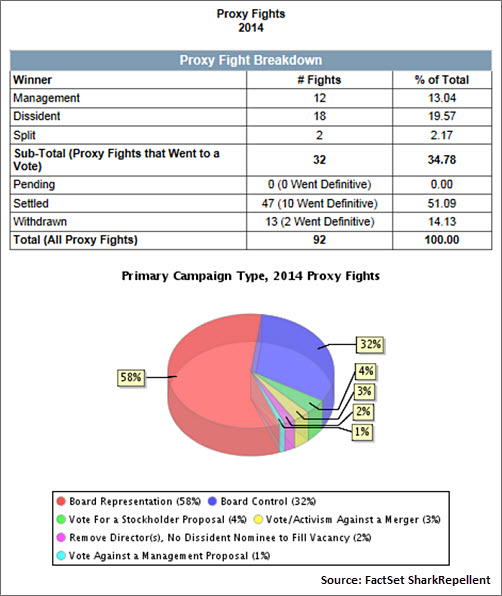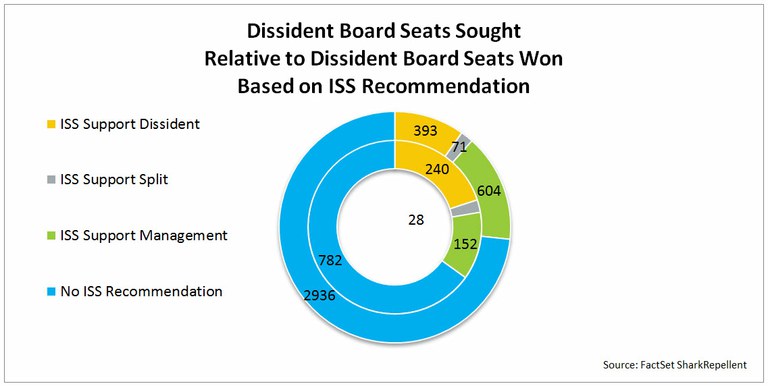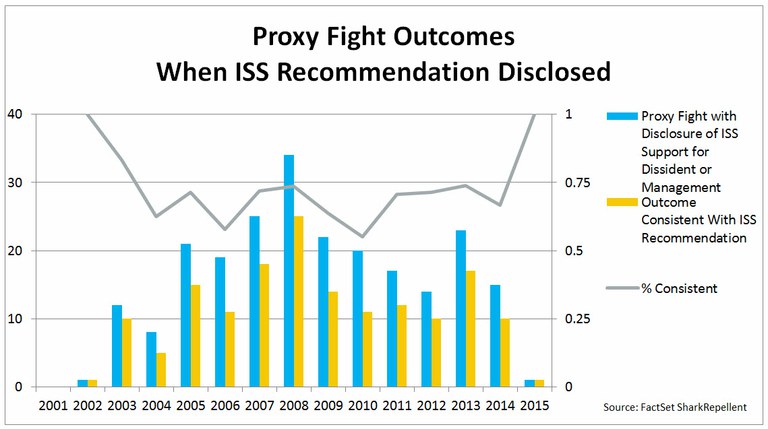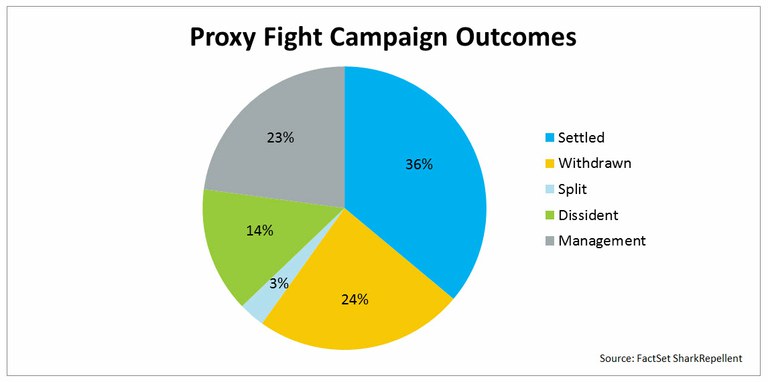Activists and corporate targets covet the endorsement of ISS (Institutional Shareholder Services Inc.) in a proxy fight as though such an endorsement will be the deciding factor in a close proxy contest. The ISS endorsement is an independent opinion on the activists’ thesis for demands of a targeted company; in cases where the activist also puts forth nominees to the board of directors, ISS recommends support for either the activist or company director nominees. The ISS recommendation certainly validates a strategic perspective, but the parties involved desire it primarily for the degree of influence the recommendation will carry in the actual vote. As a proxy advisor service, ISS voting service has actual control over voting of shares under its control and will vote in accordance with ISS recommendations. In The Activist Investor Blog, Michael R. Levin suggests that 10-40% of total shares voted, a number far beyond what ISS actually controls, have in the past been voted based on a policy to follow ISS recommendations. However, currentstudies suggest that the influence of ISS on overall outcomes is waning as institutional investors have taken the responsibility of developing their own policies and making voting decisions on a case-by-case basis. The independence of institutional investors, however, coincides with a rise in interest and media coverage surrounding activism, specifically the media’s strong reliance on ISS recommendations as part of the coverage of a proxy fight. The media’s use of the ISS recommendation likely shapes the narrative of the proxy fight and the overall public opinion of the company, which may indirectly affect the voting decision of an institutional investor. The question is how the predictive, or persuasive, value of the ISS recommendation has been affected by more holistic inclusion of the recommendation in proxy fight voting.

Proxy fights for board seats are the most common, and often most contentious, struggle between an activist and a target company. FactSet SharkRepellent has identified 1,155 proxy fight campaigns for boards seats since 2001, of which of 62% have been waged since 2008. Of those 1,155 campaigns, 405 ultimately went the distance. Of those, 233, almost 60%, included one side publicly disclosing the recommendation provided by ISS. ISS recommended for the majority of the dissident slate in over 40% of the proxy fights and recommended at least one activist-nominee in an additional 8% of campaigns. There are also 25 campaigns that settled prior to reaching a vote where ISS supported the dissident. In the aggregate, activists received 70% of the board seats sought from the settlements.

The ISS recommendation predicts the outcome of the proxy fight in nearly 70% of campaigns, and in no year did the party with ISS support lose the majority of the proxy fights. As for the year-over-year proxy fight analysis, for all campaigns where the ISS recommendation was disclosed in full support of either the dissident or management slate, the difference between the outcomes of proxy fights being consistent with ISS recommendations for 2001-2007 relative to 2008-2014 was only 1.5% (69.8% to 68.3%). The overall percentage consistent with ISS recommendations suggests the credibility of its independent review, but the aggregate statistics do not support either the argument that ISS has too much influence nor that whatever influence it has is beginning to recede.

The overall predictive value of the ISS recommendation has remained constant, but the predictive value with regard to the party receiving the recommendation has flipped. An ISS recommendation for the dissident had an overall predictive value of only 58%, while ISS support of management resulted in management winning the proxy fight in 73% of the campaigns. Since 2012, however, ISS support for the dissident has resulted in the dissident winning the proxy fight in 72% of the campaigns. During the same period, ISS support for management was predictive in only 59% of campaigns, and predictive value of its recommendation in support of management fell from 79% to 64% between the first and second half of the sample.
The disclosure of ISS support in the last three years was more often for the dissident than management, whereas in the overall sample, ISS supported management 1.2 times more often than the dissident. The shift in frequency of ISS support is consistent withMartin Lipton’s assertion that burden for a company to obtain ISS support has changed from “[h]ave the dissidents made a compelling case that change is warranted” to “[h]as the corporation made a compelling case that change is not warranted.” However, the ISS recommendation is based on an independent review, so the new public support for activism would not be a causal factor in the shift in ISS recommendation frequency, but the shift in ISS recommendation frequency, regardless of its origins, may be causal factor in the public’s greater embrace of corporate change when the dissident has the recommendation of ISS.

The influence of ISS from this analysis is limited to situations where the ISS recommendation was publicly disclosed, which is often by the party receiving the positive recommendation. Thus, ISS may not, in fact, actually be supporting the dissidents more often than in the past; activists that do not get the recommendation from ISS may simply abandon the campaign. SharkRepellent identified 275 proxy fights for board seats that were withdrawn, only four of which included ISS support disclosed for the dissident. Companies that lose the ISS recommendation may also prefer to settle with the activist, negotiating for non-disclosure of the recommendation as part of the settlement. Of the 485 proxy fights that were settled, only 20 were settled where there was disclosure of an ISS recommendation in favor of management. Part of the influence of the ISS recommendation likely remains behind the scenes, but as Mr. Lipton conceded in his memo, engaging with activists and perhaps settling to avoid the public sentiment shifting in favor of the activist is a reasonable strategic decision even if the number of votes that go in lock-step with the ISS recommendation has waned.
